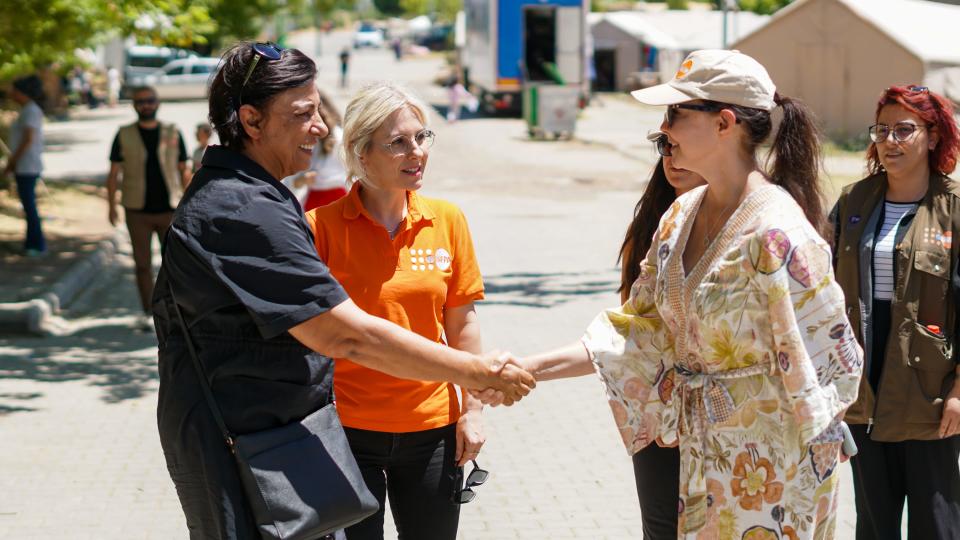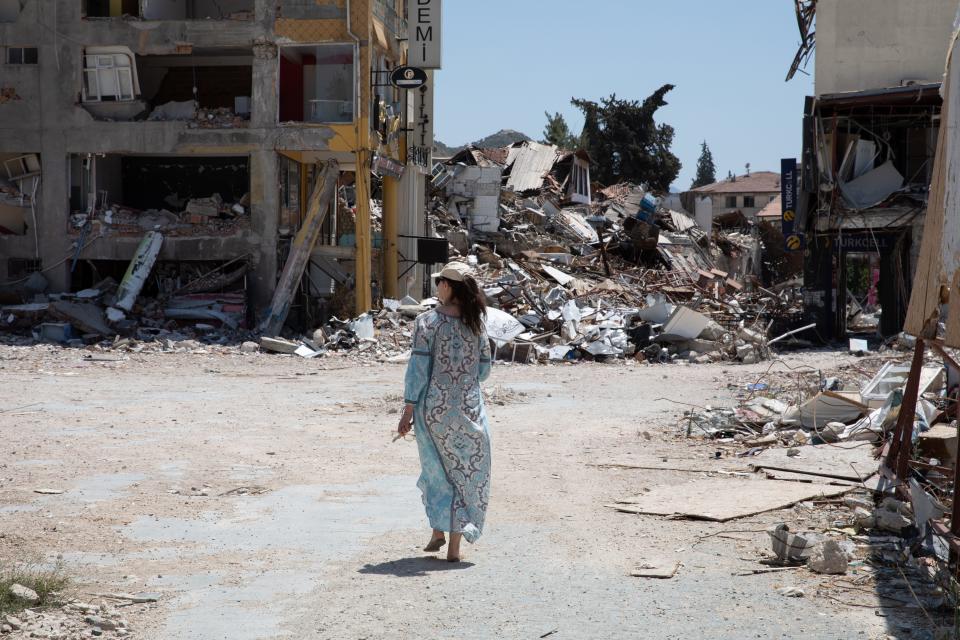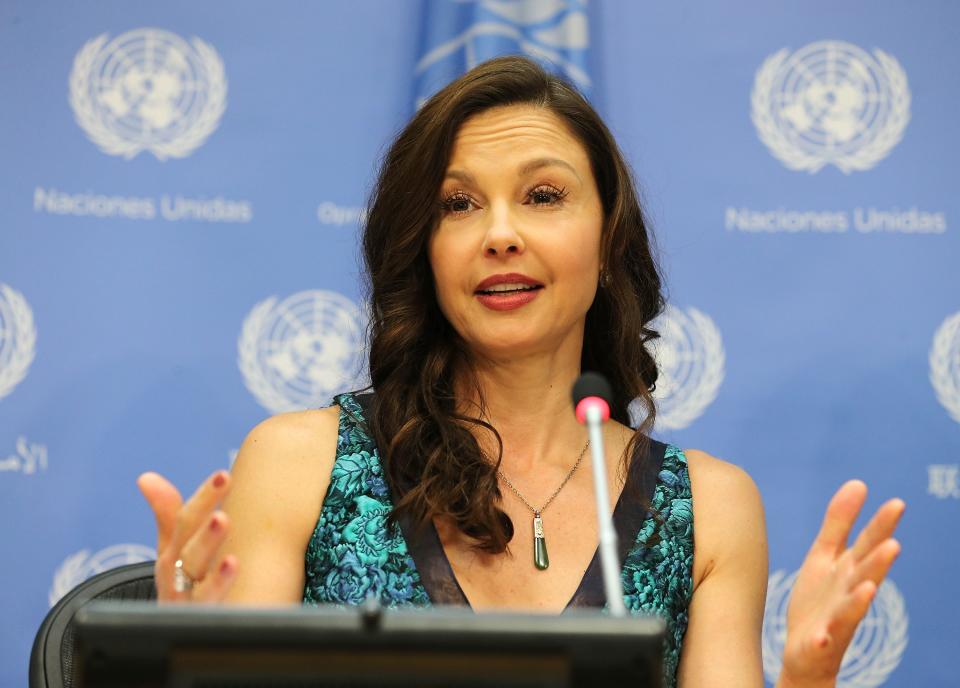Ashley Judd: We have the power to help women and girls caught in crises. Why won't we?
- Oops!Something went wrong.Please try again later.
We are abandoning women and girls caught in crises.
They are in a meat grinder of war and the calamity of natural disaster. We have left them to anguished suffering and even death. I’m saying this with propulsive sorrow because once again the world is failing to pay for half of the sexual and reproductive health care needed in humanitarian settings, care that's so intrinsic to human life.
This year, a record 114 million people fled their homes amid a breathtaking rise in global conflict and climate carnage. In some crises, an astonishing 90% of those displaced were women and girls. Fortunately, millions did find support and solace in 50 countries through the tireless, lifesaving efforts of UNFPA, the United Nations sexual and reproductive health agency.
However, millions more found nothing but wrenching, choiceless choices, desperation and despair, because there was not enough money to pay for essential reproductive health services. UNFPA’s overall humanitarian response plans were just 50% funded this year. In some places like Colombia, Guatemala and Honduras – migrant corridors battered by storms and besieged by violence – humanitarian needs went more than 90% unfunded.
This is blatant neglect of the rights of women and girls. It is a betrayal of our basic values and principles, our human decency and simple compassion.

Global crises only make women, girls more vulnerable
As I have seen in more than a dozen visits to UNFPA programs, when the bombs drop and the earthquakes convulse communities, the sexual and reproductive health and rights of women and girls do not miraculously self-suspend. In fact, a pregnant woman will be even more vulnerable to dying in childbirth.
The male-perpetrated beatings, sexual assaults and other horrors of gender-based violence intensify and worsen in the cauldron of conflict. Contraception is almost never prioritized at this moment, when women’s and girls’ futures are most precarious, and when their autonomy is most compromised.
Do we aspire to be the type of people who actually care one whit about half the world’s beating hearts? Then until we end crises for good, we must act urgently to make more bearable the plight of these women and girls. That means ending unsafe childbirth, preventing unintended pregnancies, eliminating the scourge of early marriage, and meeting core sexual and reproductive health needs.
More from Ashley Judd: Americans thought child labor was a travesty 'over there.' That myth has been shattered.
The funds required are not even that much. About $500 million would close the gap globally. That would be a blip in the budget of a large city and a fraction of the wealth of some individuals. That sum is the difference between a walk of tragedy or resilience for girls and women.
In 2024, UNFPA predicts it will need $1.2 billion to support 48 million women, girls and young people in catastrophes across 58 countries. If it is once more shortchanged on half of that amount, the consequences will be most brutal in countries that rarely make the headlines, where the suffering is acute and near-constant. Countries like South Sudan, where UNFPA’s humanitarian services were only 45% funded this year.
When I visited South Sudan, I met women unable to use the outdoor toilet at night without risking assault until they received UNFPA dignity kits containing flashlights and information about protection services – inexpensive but life-altering support.
It grieves me, and makes me ever more determined when I meet women like Amira, in Hatay, Turkey, who survived literal earth-shattering destruction in the February quakes that killed more than 50,000 people in Turkey and Syria. Just weeks later, in a tent camp surrounded by rubble, Amira gave birth to a beautiful and healthy baby, thanks to UNFPA-supported prenatal care, monitoring and safe delivery services.

Closing the funding gap is a first step toward peace
My life itself is evidence of how communities in crushing poverty and riven by conflict can still deliver lifesaving health care, using every unlikely means – often boiling down to “mere” compassion.
Texas abortion ruling: The Republican abortion message out of Texas is clear: Judges, not doctors, know best
When I broke my leg in four places, paralyzed my foot, and was hemorrhaging in the remote jungle of the Democratic Republic of Congo, I was saved by the attention and humanity of my community. Papa Jean reset my bones with his bare hands – twice. Papa Didier guided a rickety motorbike for six hours on a narrow forest trail while Papa Maradona sat squeezed behind me on the bike, holding my loose bones together with his hands and making sure I didn’t fall off if I passed out. Local women comforted me as I languished on the rain forest floor, repeating, “I encourage you."
Their devotion saved my life, and improbably my leg. The problem is that these heroes are invisible to policymakers. They get by with nothing. They deserve resources.

These beautiful heroes and survivors are pressed into my soul. We have wept and danced together. Over and over, women and girls support each other to somehow carry on at the worst moments of their lives. But they cannot do it alone.
I yearn for a peaceful and safe world. It will come when we honor and uphold the needs and rights inherent in sexual and reproductive health. Closing the funding gap for this fundamental human need is the essential first step.
Ashley Judd is a humanitarian, writer and actor and has served as a United Nations Population Fund's Goodwill Ambassador since 2016.
You can read diverse opinions from our Board of Contributors and other writers on the Opinion front page, on Twitter @usatodayopinion and in our daily Opinion newsletter.
This article originally appeared on USA TODAY: Ashley Judd: Women, girls have right to sexual, reproductive health

